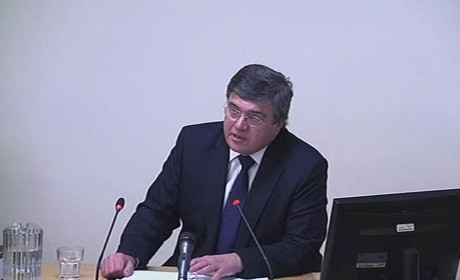
Peter Clarke: 'It would have taken a huge amount of strong, compelling evidence to persuade me to take a different course'
A former Metropolitan police deputy assistant commissioner who oversaw the 2006 investigation into News of the World phone-hacking has said it would have been "completely impractical" to have broadened the inquiry to pursue other journalists and approach other potential victims of voicemail interception.
Peter Clarke said today that his opinion at the time was that "a much broader and lengthier investigation" was "not appropriate" and that it had "not made any operational sense" to offload the phone hacking investigation to another division within the force to free up resources on the Met's over-stretched counter-terrorism unit.
He told the Leveson inquiry today: "It would have taken a huge amount of strong, compelling evidence to persuade me to take a different course."
The 2006 inquiry, Operation Caryatid, resulted in the jailing of News of the World royal editor Clive Goodman and private investigator Glenn Mulcaire in January 2007. They admitted listening to voicemail messages left on the phones of royal aides Jamie Lowther-Pinkerton, private secretary to Princes William and Harry, and Helen Asprey, the Princes' personal secretary.
Clarke, who retired from the force in 2008, said he had given much thought to handing the investigation to another part of the police, but made an "informed decision" to limit its scope and pursue it within the anti-terrorism unit because his officers were up to speed with the techniques used and had the trust of the Palace.
He said: "On this particular occasion I had to look at it and decide could I realistically ask anyone else in the police service to take this on. For a number of reasons, it was totally impractical."
Clarke said that, after the arrest of Goodman in 2006, it became "immediately apparent that we would not get any co-operation whatsoever from News International".
He told the inquiry: "Usually, companies bend over backwards to preserve their reputation, but this was a closing of the ranks from very early on.
"That sort of attitude would be likely to make me more determined to pursue the investigation, but I had to take into account the realities of resources."
He added: "Would it be reasonable, bearing in mind that we received no co-operation with News International, to go out and arrest [more] journalists? We wouldn't have substantial issues to put to them - it would have been a complete reverse of good investigative practice."
Clarke said he has not "seen any evidence" which would cause him to have made a different decision at the time not to pursue the investigation further. He said he had to decide "what poses a threat to the lives of the British public" and: "To put it bluntly, [breaches of privacy] don't kill you - terrorists do."
Lord Justice Leveson later replied: "There is no doubt that there is a rather unfortunate catalogue of events surrounding this [police] inquiry, the result of which is now potentially extremely damaging and that needs to be explained."
Free daily newsletter
If you like our news and feature articles, you can sign up to receive our free daily (Mon-Fri) email newsletter (mobile friendly).









